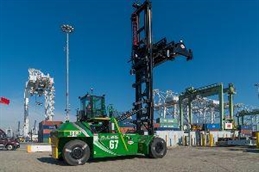
The chief of the Port of Long Beach called on port authorities of American ports to pursue sustainability while addressing congestion issues in the industry.
Talking to industry leaders during the American Association of Port Authorities Legislative Summit in Washington, D.C., Mario Cordero, Port of Long Beach Executive Director said "seaports have a duty to protect the communities they serve from air pollution associated with goods movement."
Speaking in his capacity as the AAPA Board of Directors chairman, Cordero urged port authorities to commit to "environmental social governance" – developing policies to decarbonize and convert cargo-handling and drayage truck fleets to zero emissions.
"We must recognize that protecting the health of our neighboring communities from harmful emissions due to port operations is a paramount responsibility," Cordero said.
"As port executives, you can make a difference, the only question is whether you will choose to make a difference," he added.
Steven Neal, Long Beach Harbor commission president noted how it is possible to boost port operations and pursue environmental sustainability.
"Our diesel particulate emissions are down 90% since 2005, even while cargo has increased more than 20%, because of the landmark Green Port Policy and the Clean Air Action Plan," Neal said.
On Friday, April 1, the ports of Long Beach and Los Angeles launched the Clean Truck Fund rate. The rate – US$10 per twenty-foot equivalent unit on loaded import and export cargo containers hauled by drayage trucks as they enter or leave container terminals – will be collected from beneficial cargo owners and will help fund and incentivize the changeover to cleaner trucks.
Exemptions to the CTF rate will be initially provided for containers hauled by zero-emission trucks and low-nitrogen oxide-emitting trucks. It is expected to generate up to US$90 million in the first year to help incentivize the development and deployment of zero-emission (ZE) trucks and infrastructure at the ports.



